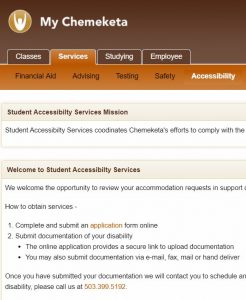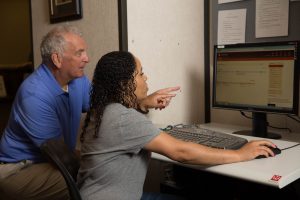17 Student Accessibility Services
“Accessibility helps us tap into everyone’s potential”
-Debra Ruh
Everyone has different sets of abilities and students often need a bit of help in college as well as accommodations in classes to be successful. One resource for students with different abilities at Chemeketa is the Student Accessibility Services (SAS) office. The mission of SAS is to help Chemeketa students with different abilities contribute and be active participating members of the college community while help with the acquisition of knowledge and values that will serve as lifelong skills. The Student Accessibility services ultimately aim to promote a fully integrated university experience for students with disabilities by ensuring that students have equal access to all areas of student life and receive appropriate educational support to foster their academic and personal success. After all, education is a right, not a privilege.
In efforts to comply with the Rehabilitation Act of 1973 and the Americans with Disabilities Act as amended in 2008 (ADAAA), also following the college’s mission. Chemeketa established a wealth of accommodations for students with disabilities to feel at home from day one until graduation. Their services include:
- Adaptive equipment for classrooms
- Alternative format class materials
- Note-taking services
- Testing accommodations
- Deaf and Hard-of-Hearing services.
Additionally, if any students wish to learn more about the offerings provided by SAS, it is encouraged for them to stop by the Student Accessibility Services Building located in building 2, room 174.
How to Apply
If you are student new to SAS but you believe you meet the requirements to apply for a disability then the first step would be to gather all information that documents your disability and then complete an application at the SAS’s office or online. The online application form is located in the student service tab > student accessibility services > apply for service. If assistance is needed completing the form, you can come to the SAS office and receive assistance. Once the application is completed and submitted, the student must call Student Accessibility Services to schedule an appointment. The number to call is 503.399.5192. However, if an online application is not suited for the student other options for applying include submitting legitimate documentation of disability, or scheduling an appointment with an accommodation specialist by calling their phone number 503.399.5192.

Keep in mind that in order for Chemeketa to determine your eligibility for academic accommodations, you must submit documentation of disability from a qualified professional. This means that you, as a student are responsible for paying for any medical or psychological assessments and record request fees. Your documentation of disability must also include how your condition substantially limits a major life activity. All documentation will be considered and reasonable and appropriate accommodations are determined on a case-by-case basis by Student Accessibility Services. If you are looking for another option as substitutes for an acceptable documentation form, interview, and formal assessments with your accommodation specialist can be requested to 503.399.5192.
On the other hand, if a student has already been approved for services, then they must simply log in to the AIM Database to request their accommodations each term and/or schedule an exam.

Navigating your campus
When a new student is all alone at college it is quite easy to get lost in the blending buildings regardless of how well the student thought they knew the campus. That is why Chemeketa believes it is a good idea for all students to take some time before the term begins to explore campus and figure out where each class will be that what when the first day comes, the student is oriented and knows where to go. If for any reason a student cannot explore the campus before the term begins then it is no reason to stress, each building has a map posted against their walls towards the entrance of each building to attempt to orientate any lost students. Additionally, if a student needs assistance going up the stairs below are useful elevator locations:
- Brooks Center Elevator Locations
- Salem Campus Elevator Locations
- Yamhill Valley Campus Elevator Locations
Licenses and Attributions
Original chapter work is attributed to Ashley Duran and edited by Grecia Garcia.

